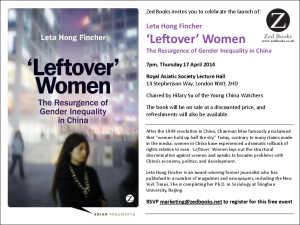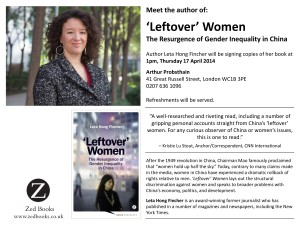Posted: April 17th, 2014 | No Comments »
Regular readers will know that the first two books in this great series from Penguin China have already been published and are available on Kindle and, in Asia, in hard copy form. Here are the titles in the rest of the series (including my own coming soon) – they all look fantastic (click on the image to enlarge)…..
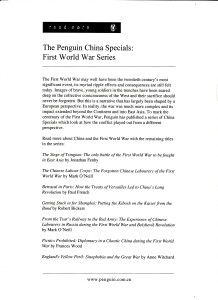
Posted: April 16th, 2014 | No Comments »
Some photographs of China and Hong Kong from the 1860s, believed to be among the earliest of their kind in existence, came up for auction the other day. The scenes of ordinary Chinese life and Hong Kong streets and harbour are remarkable. The photographs are taken from the China Magazine, which began as a weekly publication on March 7 1868 and continued monthly until it reached its fourth and final volume in 1870.
Here’s a link to a selection of the images in the Daily Mail
Posted: April 16th, 2014 | No Comments »
Louisa Lim’s The People’s Republic of Amnesia is now published. I’ve read and was greatly impressed but am reviewing elsewhere so here’s the blurb….

On June 4, 1989, People’s Liberation Army soldiers opened fire on unarmed civilians in Beijing, killing untold hundreds of people. A quarter-century later, this defining event remains buried in China’s modern history, successfully expunged from collective memory. In The People’s Republic of Amnesia, NPR correspondent Louisa Lim charts how the events of June 4th changed China, and how China changed the events of June 4th by rewriting its own history.
Lim reveals new details about those fateful days, including how one of the country’s most senior politicians lost a family member to an army bullet, as well as the inside story of the young soldiers sent to clear Tiananmen Square. She also introduces us to individuals whose lives were transformed by the events of Tiananmen Square, such as a founder of the Tiananmen Mothers, whose son was shot by martial law troops; and one of the most important government officials in the country, who post-Tiananmen became one of its most prominent dissidents. And she examines how June 4th shaped China’s national identity, fostering a generation of young nationalists, who know little and care less about 1989. For the first time, Lim uncovers the details of a brutal crackdown in a second Chinese city that until now has been a near-perfect case study in the state’s ability to rewrite history, excising the most painful episodes. By tracking down eyewitnesses, discovering US diplomatic cables, and combing through official Chinese records, Lim offers the first account of a story that has remained untold for a quarter of a century. The People’s Republic of Amnesia is an original, powerfully gripping, and ultimately unforgettable book about a national tragedy and an unhealed wound.
Posted: April 15th, 2014 | No Comments »
Talk by Chris Corin: “May 30th Changes Everything”
How an event in Shanghai in 1925 challenged British policy makers and how the Shanghailanders (entrenched British settlers) complicated thingsDate: Tuesday, 15th April
Time: 6:30pm
Venue:Â SOAS (School of Oriental & African Studies), Russell Square, Main Building G3Entry: Members of The Meridian Society, SACUÂ & SOAS CSSAÂ free
Non-members £5 donation
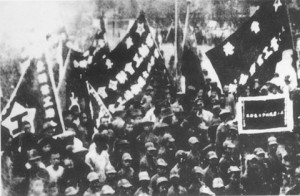
On May 30, 1925 workers and students demonstrated on the Nanking Road, the main shopping thoroughfare in the International Concession, in Shanghai. They were shouting slogans, “Take back the concessions†and “down with the imperialists†and they were told to disperse. 10 seconds later the Shanghai Municipal Police, commanded by a British officer, opened fire on an unarmed crowd. 13 were killed and more than 20 wounded. The event mobilised Chinese nationalism “as a nation responded to a policeman’s bulletâ€, and was a direct challenge to British policy makers. Shanghai was the most significant single element of British interest in China, and Britain sought to defend that interest but the Foreign Office was aware of the limits of British power. The Shanghailanders were not. The Shanghailanders, as they called themselves, were the small treaty port people, whose fortunes were inextricably tied up with the existence of the British concessions and extraterritorial privileges in China. Even a Shanghailander himself called them, “the spoilt children of the Empireâ€. They were to complicate British policy making. Indeed “the ramifications of the imperialist mind†has been called “the barbed wire thread which bound together the whole fabric of foreign imperialism in China and made it so unbearable to Chinese nationalism.â€Â This talk will look at 3 things:
Â
·      The clash between nationalism and imperialism and the challenge this brought to British policy makers
·      The views, actions, hopes and fears of the Shanghailanders.
·      The implications for today of the intertwined and interconnected histories of Britain and China.
Â
Chris Corin is a member of The Meridian Society. He taught History at Worthing College for many years. With Terry Fiehn, he has written Russia under Tsarism and Communism 1881 – 1953 (2nd edition 2011) and a number of articles for History Review and New Perspective. He has a long standing interest in British Foreign Policy and, after a visit to Shanghai, became fascinated with the development of that great city.
Posted: April 6th, 2014 | No Comments »
China Rhyming is away in New York this week and taking a short break from posting…so here’s a few shots of Manhattan’s old Chinatown….
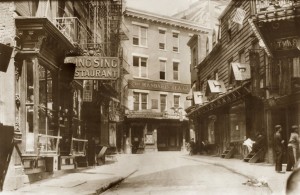
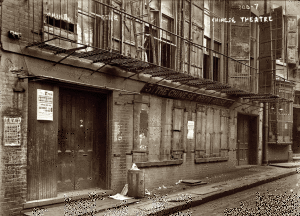
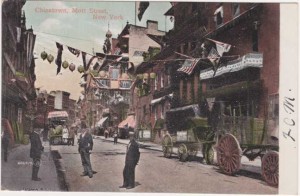
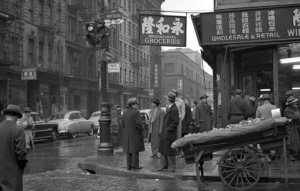
Posted: April 5th, 2014 | No Comments »
An interesting piece by Bill Lascher in Boom: A Journal of California. It’s about radio station XGOY and a dentist in Ventura, California who was the station’s contact in the U.S.

Posted: April 4th, 2014 | No Comments »
  RAS LECTURE
Tuesday 8 April 7:00 for 7:15 PM
RAS Library at the Sino-British College
1195 Fuxing Zhong Lu
Â
Non Arkaraprasertkul
PhD Candidate in Anthropology, Harvard University
Harvard Asia Center Affiliate, Harvard Center Shanghai
Â
 speaking on
Â
“Housing and Heritage: Political Economy and Urban Space in Shanghai Lilong Neighborhoods”

In massive development projects that often directly affect “traditional” Shanghai neighborhoods, the city’s local government has drawn urban planning inspiration from cities such as New York, London, and Tokyo, which have achieved architectural distinction as “global cities” by combining modern high-rise and heritage buildings. City branding is a major part of Shanghai’s urban development program, and the preservation of historic buildings is seen as integral to this emerging brand. The underlying rationale is to protect “architectural artifacts” that the local government considers appropriate for a city with global ambitions. The central question, however, is: how does the image of urban globalization affect the citizenry whose lives the city government is claiming to improve? More broadly, the politically charged context of “traditional” neighborhood preservation situates contested forms of expertise mobilized by local government actors, neighborhood residents, and architects and planners.
Â
As a result, old neighborhoods have been removed to make way for modern high-rises, condominiums, office and commercial buildings, and so on. In the process, not only are people forced from their homes, but their displacement also raises the critical question: what Shanghai should be as a city, whom it should serve – whether that should be the local population or global commerce. Exemplifying this issue are contestations surrounding the traditional alleyway houses of Shanghai known as lilong. Literally meaning “neighborhood lane,” the lilong (里弄) are the legacies of Shanghai’s Treaty Port era (1842-1946), representing the Chinese take on the British row house aesthetic. The lilong also constituted the primary housing stock found in Shanghai up until the early 1980s, with multiple generations having occupied the same dwellings for 100 years or more.
Â
Historians, journalists, and architects often share the opinion that lilong neighborhoods are historically important and, therefore, must be preserved. In many ways the attitude underlying this opinion – based as it is on a Eurocentric notion of the global city – encourages the local government’s romanticization of Shanghai’s neighborhood life, similar to the gradually disappearing courtyard houses in Beijing (“hutong,” 胡åŒ). In this presentation, I will present my ongoing doctoral research regarding the sociopolitical conflicts over the intertwined issues of heritage, urban space, and human rights – in which the lilong is at the center.
About Non Arkaraprasertkul
Trained as an architect, urban designer, historian and ethnographic filmmaker, Non Arkaraprasertkul is currently a PhD Candidate in Anthropology at Harvard University. He has published widely in the fields of urban studies, architectural history, and urban anthropology. His research interest lies in the crossroad of transdiscliplinary research between architecture and the social sciences. In the spring of 2013, he served as Distinguished (Visiting) Gibbons Professor of Architecture at the University of South Florida (USF). Previously, he was a visiting lecturer in Architecture and Urban Design at the Massachusetts Institute of Technology (MIT) in 2007-2008, and an adjunct professor in Modern Chinese History at Lesley University from 2012 to present.Â
Â
Non has master’s degrees in history, theory, criticism of architecture, and architecture and urban design from MIT, and Modern Chinese Studies from the University of Oxford. From September 2013, he will be based at Fudan University as Harvard-China Council Exchange Scholar and at Harvard Shanghai Center as Harvard Asian Center Affiliate conducting his doctoral research “Locating Shanghai: Globalization, Heritage Industry, and the Political Economy of Urban Space.” He can be reached at non@mit.edu.
RSVP: to RAS Bookings at: bookings@royalasiaticsociety.org.cn or just Reply to this email.
 Â
ENTRANCE CONTRIBUTION: Members 50 RMB Non-members 70 RMB. Includes a glass of wine or soft drink. Priority for RAS members. Those unable to make the donation but wishing to attend may contact us for exemption.
Â
MEMBERSHIP applications and membership renewals will be available at this event.
Â
RAS MONOGRAPHS – Series 1 & 2 will be available for sale at this event. 100 rmb each (cash sale only)
Â
WEBSITE: www.royalasiaticsociety.org.cn


